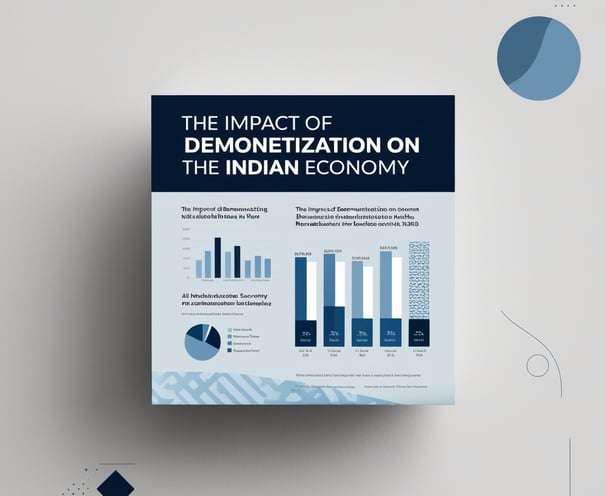We are launching Scholarly.InvestorIndia.in and inviting all the students and professors to submit their papers on our website and get more attention!
The Impact of Demonetization on the Indian Economy
INDIAN ECONOMYFEATURED
8/31/20242 min read
On November 8, 2016, the Indian government announced the demonetization of ₹500 and ₹1000 banknotes, which accounted for 86% of the country's cash supply. This bold move was aimed at tackling the menace of black money, reducing corruption, and promoting a cashless economy. However, the sudden withdrawal of high-denomination notes had significant short-term and long-term effects on the Indian economy.


Short-term Impacts
Cash Crunch: The immediate aftermath of demonetization was a severe cash shortage, as people rushed to banks to exchange their old notes. This led to long queues at ATMs and banks, disrupting daily life and business activities.
Decline in Economic Activity: Due to the cash crunch, economic activity slowed down across various sectors, particularly in the unorganized and informal sectors. Researchers estimate that demonetization reduced economic activity by at least 3 percentage points in November and December 2016.
Job Losses: The slowdown in economic activity resulted in job losses, especially in small enterprises and the unorganized sector. Labor unions reported a decline in employment due to demonetization.
Stock Market Decline: The stock market indices dropped to a six-month low in the week following the demonetization announcement, with the BSE SENSEX crashing nearly 1,689 points and the NIFTY 50 plunging by over 541 points.
Long-term Impacts
Increased Digital Transactions: Demonetization effectively turned India towards a cashless economy, with digital payments doubling in most tier-II and tier-III cities. This transparent way of transacting leads to more tax payments and less untaxed money circulating in the market.
Curbing Terrorism and Anti-National Activities: Demonetization put a stop to the funding of terrorist groups and unlawful activities by curbing money laundering and making it easier for the income tax department to trace cash.
Increase in Tax Filers: The Income Tax Department added 1.07 crore new taxpayers to its base during the FY 2017-2018, with a growth of approximately 25% in the number of returns filed compared to FY 2016-2017.
Recovery of Black Money: According to the Reserve Bank of India, more than 99% of the invalid money was returned to banks by individuals. In 2019, the then Finance Minister Piyush Goyal announced ₹1.3 lakh crore in black money recovery through all anti-black money measures, including demonetization.
Demerits of Demonetization
Panic and Chaos: The sudden announcement of demonetization caused panic and chaos in the country, affecting daily wage workers who were out of work as their employers could not pay them in cash due to the cash crunch.
Increased Government Expenses: The government's expenses increased due to the printing of new currencies to replace the demonetized notes.
Slowdown in the Economy: The cash crunch affected businesses and caused a slowdown in the economy for some time. The unemployment rate stood at a four-year high from 2016 to 2017 when demonetization was undergone.
Temporary Reduction in Economic Activity: Researchers estimate that demonetization reduced economic activity in India by at least 3 percentage points in November and December 2016. However, the effects began to dissipate in the following months, and by June 2017, the shortage was mostly over.
Conclusion
Demonetization was a bold move by the Indian government to tackle black money, reduce corruption, and promote a cashless economy. While it had significant short-term impacts, such as a cash crunch, decline in economic activity, job losses, and stock market decline, it also had long-term benefits, including increased digital transactions, curbing of terrorism and anti-national activities, an increase in tax filers, and the recovery of black money.
However, demonetization also had its demerits, such as causing panic and chaos, increasing government expenses, slowing down the economy, and temporarily reducing economic activity. The Indian economy has since recovered from the short-term effects of demonetization, and the long-term benefits are still being realized.
Related Stories
Good News empowers the generation of tomorrow for a brighter future and hope for every individual.
Reframe your inbox
Subscribe to our newsletter and never miss a story.
We care about your data in our privacy policy.
© 2023 InvestorIndia. All rights reserved.
